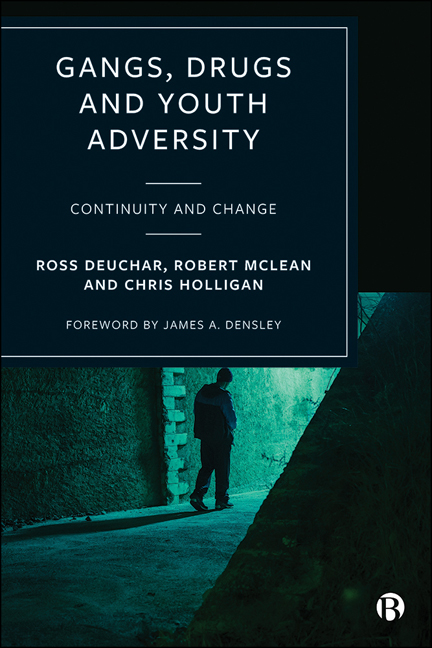Book contents
1 - Introduction: Gangs and Violence in the UK
Published online by Cambridge University Press: 13 May 2022
Summary
In this opening chapter, we begin by setting the stage for the remainder of the book by outlining the context for our research and by considering its unique contribution. Following this, we explore the ‘international turn’ that gave rise to the emergence of European gang research and how UK scholars remained resistant to the ‘gang’ label for a number of years. We delve into the great UK gang debate that has often been characterised by a subculture– gang division, as well as the recent empirical insights that provide overwhelming evidence that the street gang is a real and (in some contexts) growing phenomenon in several parts of the country. We draw attention to recent issues of concern in England and Wales where 2018–19 was a watershed period for street violence. We examine the nature of the government's ‘Serious Violence Strategy’, the emerging focus on adopting a ‘public health’ approach to violence reduction and prevention, and how Glasgow, located in the west of Scotland, has increasingly been drawn upon as a site of interest in this regard.
Setting the stage: the context and contribution
In recent years, much political and media attention has been placed on the issues of knife crime and violence across the UK (and particularly in its capital city, London). There has also been a great deal of emphasis on the recognised need for a public health approach to tackling these issues, and an ever-growing interest in Glasgow and the wider west of Scotland's transitional journey in relation to street gangs and knife crime. Given this, we believe that this book is extremely timely. Our qualitative data set (presented in Part II of the book), combining the perspectives of practitioners with those of contemporary young people and adults who have been involved in these issues in and around Glasgow, makes the book unique.
In its pages, readers will learn more about the extent to which issues relating to street gangs and weapon-carrying/use have changed in the west of Scotland, as well as the more contemporary challenges. In particular, readers will gain insight into the nature and impact of gang intervention programmes and initiatives in and around Glasgow, and the impact of the public health approach that has been adopted there (see discussion in later chapters on the specifics of the public health approach).
- Type
- Chapter
- Information
- Gangs, Drugs and Youth AdversityContinuity and Change, pp. 3 - 16Publisher: Bristol University PressPrint publication year: 2021



